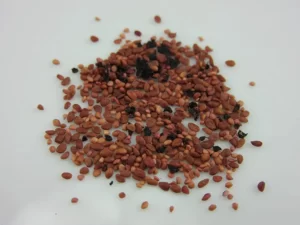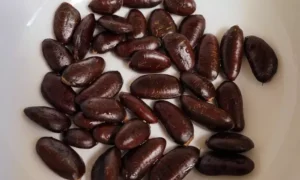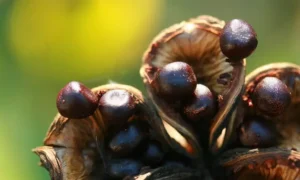Do blueberries have seeds? This is a question that has been on the minds of many people for centuries. The answer to this question has been a source of debate for a long time.
In this blog post, we will explore the truth about blueberries and answer the question: Do blueberries have seeds? We will examine the different types of blueberries, their anatomy, and their history to provide a comprehensive answer to this age-old question.
Introducing The Topic
Do blueberries have seeds? These are questions that many people often ask, and it can be difficult to find the answer.
Blueberries are a beloved fruit with a long history of use in cooking, baking, and even medicinal remedies. But the question remains: do blueberries have seeds?
In this blog post, we will explore the anatomy of blueberries and dive into the truth about whether or not blueberries have seeds.
What Are Blueberries?
Blueberries are a sweet and tart berry native to North America that is most popularly consumed fresh but can also be enjoyed in jams, jellies, pies, and smoothies.
- There are two types of blueberries: the lowbush or wild blueberry and the highbush or cultivated blueberry. Both types have a soft and juicy texture and contain several small seeds.
- This brings us to the question: do blueberries have seeds? Blueberries do indeed have seeds, with each berry containing an average of 10-20 tiny, edible seeds.
The seeds are so small that they are virtually undetectable to the human tongue, making them an ideal treat for those who prefer their fruits to be seedless.
The seeds themselves are not harmful and contain healthy fats, protein, and dietary fiber.
The Anatomy Of a Blueberry
When asking the question, “Do blueberries have seeds?”, the anatomy of a blueberry is an important factor to consider.
A blueberry consists of an outer skin that is covered in tiny hairs and an inner fleshy part that contains numerous small, hard, round seeds.

So the answer to the question, “Do blueberries have seeds?” is yes.
The seeds are what give blueberries their slightly crunchy texture and are considered a great source of dietary fiber, antioxidants, and other essential nutrients.
It’s also worth noting that not all blueberries have the same amount of seeds; for example, larger blueberries usually have more seeds than smaller ones. Additionally, the seeds in blueberries are edible, so there’s no need to worry about ingesting them.
Are Blueberries Seedless?
When it comes to whether or not blueberries have seeds, the answer can be a bit confusing.
Although most people may think that blueberries are seedless, there are very small seeds inside of each blueberry. The seeds are so small, however, that they usually go unnoticed by most eaters.
The question “Do blueberries have seeds?” is not a new one. The answer to this question has been debated for centuries.
Ancient Greeks believed that blueberries were the same as grapes, and therefore had seeds. In the mid-1800s, botanists began to research the matter and concluded that, yes, blueberries do have seeds.
These tiny seeds are located at the center of the berry and are covered by a protective layer of flesh.
When you bite into a blueberry, you may feel the small, hard seeds as you chew. While the presence of these seeds does not change the taste of the berry, it may make them harder to digest.
So, Do Blueberries Have Seeds?
All types of blueberries have small, edible seeds in them. However, the amount of seeds varies depending on the variety of blueberries.
For example, wild blueberries tend to have more seeds than larger cultivated blueberries.
The seeds are tiny and relatively soft, so they can usually be eaten along with the rest of the fruit without any issues. If you ever find yourself asking “Do blueberries have seeds in them?”, the answer is yes – but they are small enough to be eaten whole!
Do Blueberries Have Seeds Of Diverticulitis?
The short answer is no. Blueberries do not contain seeds of diverticulitis. However, it is important to note that blueberries do contain small, edible seeds that are part of the fruit’s structure.
These seeds are found in the interior of the berry and are composed of an outer layer of starch and an inner layer of protein.
These small, edible seeds are referred to as “pips” or “pepitas” by some. They are typically not visible but can be felt when biting into a blueberry.
While these pips may have a slightly different texture than other fruits, they are edible and can even add a crunchy texture to a dish when included in a recipe.
So while blueberries do not have seeds of diverticulitis, they do contain edible seeds within their flesh.
It is important to understand that while these pips may be small and not visible, they are still an important part of the blueberry and should not be discarded.
The nutritional content of these small seeds should also not be overlooked as they can add valuable vitamins, minerals, and other essential nutrients to any diet.
Are Blueberry Seeds Good For You?
Many people are interested in the health benefits of blueberries and whether or not their seeds are beneficial.
It is a common misconception that blueberries do not have seeds; however, blueberries do contain small, edible seeds.
The seeds of the blueberry contain several important nutrients, including antioxidants, omega-3 fatty acids, and dietary fiber.
These components have been shown to help support overall health, including heart health and improved digestion.
Studies have suggested that eating blueberry seeds can help protect against inflammation and cell damage due to their high levels of antioxidants.
Blueberry seeds contain several plant compounds that can help improve digestion and fight off disease-causing microbes.
Overall, eating blueberry seeds can be beneficial to your health, although it’s important to note that there is not enough research to say definitively how much of a benefit they provide.
Conclusion
The answer to the question of whether blueberries have seeds is yes. Blueberries do contain seeds, although they are very small and difficult to see.
The edible part of a blueberry is the fleshy, juicy part. The seeds are not meant to be eaten, but they do provide some health benefits.
Blueberry seeds are rich in antioxidants and essential vitamins and minerals. Eating them can help boost your immune system and promote better digestion.
 How to Plant a Pawpaw Seed: A Comprehensive Guide |
FAQs
Q1: How do you remove seeds from blueberries?
To remove seeds from blueberries, simply wash the blueberries thoroughly, then place them in a fine-mesh strainer or sieve.
Using the back of a spoon or your fingers, gently press and rub the blueberries against the mesh, allowing the juice and pulp to pass through while trapping the seeds.
Rinse the seeds under cold water to remove any remaining pulp, and they are ready to use or consume seed-free!
Q2: Is it safe to eat grainy blueberries?
Yes, it is safe to eat grainy blueberries. The grainy texture in blueberries is typically caused by the presence of tiny crystals of natural sugars, known as fructose, that have accumulated on the skin or inside the fruit.
These sugar crystals are harmless and do not affect the taste or nutritional value of the blueberries. Grainy blueberries are still perfectly fine to eat and enjoy in recipes or as a snack.

